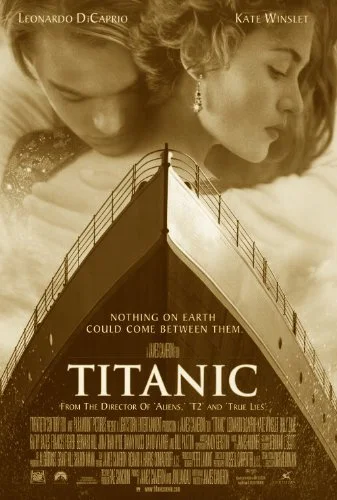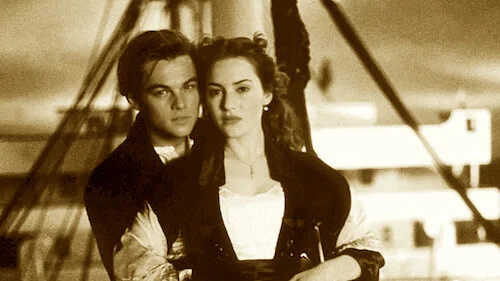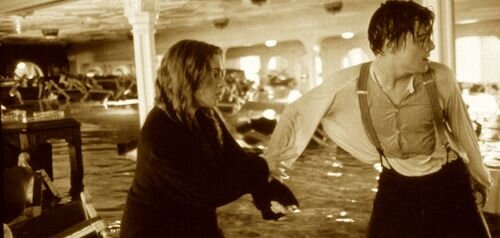Titanic
This review is a part of the Best Picture Project: a review of every single Academy Award winner for the Best Picture category. Titanic is the seventieth Best Picture winner at the 1997 Academy Awards.
It's been over twenty years. We can all agree that Titanic is basically this generation's Gone with the Wind (I can't be the only person making this comparison). Titanic is a technical achievement that is monumental for it's time. It is a romantic epic that superglues itself to a moment of history. So was Gone with the Wind. Both films beat box office records. There was a time where the records were held by both films: Titanic was the highest box office amount grossed, while Gone with the Wind reigned supreme (and continues to do so) when these numbers are adjusted for inflation.
In that same breath, I believe Titanic is not this masterpiece that it was once made out to be, but I appreciate being a part of this pop culture hysteria like any other millennial. It had to be seen by all. It was the first non-PG film I ever saw, and I saw it in a theatre. People lined up for days to get that highly collectible double VHS set that sold out in seconds at the crack of midnight. Even though the box office record has since been broken (previously by James Cameron besting himself, with Avatar, only for Endgame to top the charts this year), these current franchises that are setting unprecedented numbers just don't feel the same way. This was the last event of a golden age, when films took ages to get a home release (we were spoiled to even get home releases). The theatre event was a different kind of spectacle, and Titanic was that ticket to Hollywood back in the '20s, '50s, and '70s (the major turning point for features, mainstream epics, and blockbusters). I will always thank Titanic for being one of the last opportunities of a dying occasion that I could partake in.
The romance between Jack and Rose makes a statement on clashing classes, all set to the backdrop of a great historical tragedy.
Like I said though, Titanic wasn't really that good, was it? No. Although, I will go on record to proclaim that it has gotten its unfair amounts of flack as well. It was too praised back then, and it's too maligned now. For a romantic epic, it does a nice enough job balancing this love story between two partners of different worlds, and the sinking of the S.S. Titanic: the vessel deemed unsinkable. With mutual adoration going up against the tragedy that cost fifteen hundred lives, this film becomes a battle of longevity and legacy. Is the insinuation that the nighttime captains being distracted by Jack and Rose caused the iceberg accident really a good idea? In hindsight, that connection has aged abysmally. There had to have been a better way to have both storylines continue in that very moment.
I say this, because Titanic mostly figures out the proper ways to have both plot lines stay intact. That isn't to say that both storylines are fantastic. Rose's marriage-to-be for business decisions can be both interesting and bland, while Jack's individualistic storyline feels underdeveloped in favour of pitting both lovers together. The Titanic portions are, for what they're worth, much stronger. Judging by the opening of nautical scientists finding a modern-day Rose to hear her story, we knew right away Cameron was obsessed with the historical side of his own story (countless undersea adventures later, and it's a blatant fact that James Cameron is synonymous with underwater exploration). The recreation of the ship (physical or cgi) is with painstaking detail. Maybe a couple of effects have aged a little badly (depth perception or shadow drops here and there), but Titanic remains a stunning display of technical wizardry for its time. Hell, it's a fantastic feat before the ship begins to go down, and the highest technical capabilities are shown.
A majority of the production achievements hold up to this day.
Despite my frequent complaints about romantic epics and their lengths, Titanic sits rather easily at three hours. It may have its hiccups, but there aren't enough to really bog the film down to a mind numbing state. Titanic is good. Not brilliant. Not terrible. It's simply good, and relying on hearsay to voice your opinion won't do you any favours. Titanic's legacy was likely hoisted up even more by its record tying 11 Academy Award wins (it shares this honour with Ben-Hur and The Return of the King). Considering how many of these awards were set or effect related (okay, and that Celine Dion song is still pretty strong despite its overplay), this all makes sense. Maybe if the Academy was in the same mindset as it was in 2009 (when The Hurt Locker rightfully beat Avatar for Best Picture and Director), L.A. Confidential could have been the small-yet-mighty winner of 1997. That wasn't the case. This was the '90s, and mass appeal still dictated the course of the awards season (suddenly, 1998 happened: stay tuned). Ah well. Titanic is mostly innocent. There have been far guiltier romantic epics to win. Plus, it offered one of the final bows of the theatre extravaganza before the internet changed everything.
Andreas Babiolakis has a Masters degree in Film and Photography Preservation and Collections Management from Ryerson University, as well as a Bachelors degree in Cinema Studies from York University. His favourite times of year are the Criterion Collection flash sales and the annual Toronto International Film Festival.






